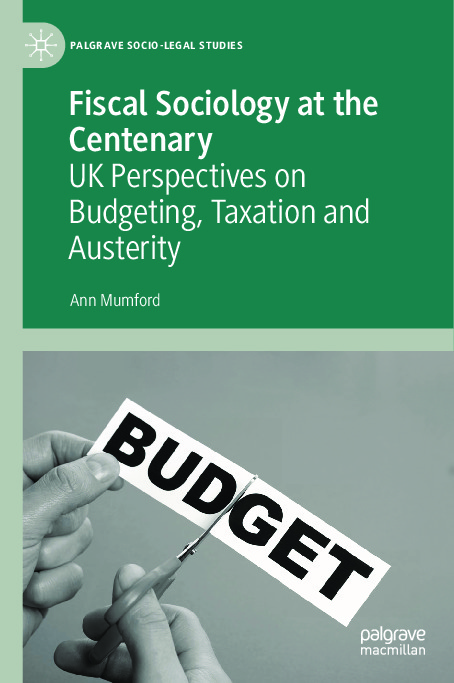File #2661: "2019_Book_FiscalSociologyAtTheCentenary.pdf"
Text
1|Contents|8
1|1 Introduction|10
2|References|16
1|Part I Fiscal Sociology|17
1|2 What Is Fiscal Sociology?|18
2|The Field: A Brief Introduction|18
3|Example of Study: Tax Revolts|19
2|The Scholar: A Brief Introduction to Joseph Schumpeter|21
3|The “Sacred Decade”|21
3|Career in the USA|23
3|Legacy|24
3|The Founding Text: ‘The Crisis of the Tax State’|25
4|The Finanzplan|31
4|Definition of the Term: Tax State|33
4|Introduction of a Methodology: Or, Why Is an Essay from 1918 Still Important?|34
2|Paretian Fiscal Sociology|36
2|What About Marx?|37
2|The Modern Fiscal Sociology|40
3|The Post-2008 Era|41
3|Parliament|41
3|The New Fiscal Sociology|43
3|Closing: A Next Step for the New Fiscal Sociology|44
2|References|46
1|Part II “What Is the Nature of the Tax State? How Did It Come About?” (Schumpeter 1918: 100)|52
1|3 The Fiscal State and Budget Institutions|53
2|The UK’s Budget History: A Fiscal, Sociological Consideration|54
3|Pitt the Younger, and the Old Sinking Fund|57
3|Gladstone’s Budget of 1853|59
3|The People’s Budget of 1909|62
2|Budgeting and Executive Power in the UK|65
3|Local Authorities and the Thatcher Era|66
3|First Lord of the Treasury|67
2|Closing|69
2|References|70
1|4 Budgets: Process, Rights, and Institutions|75
2|Process: Twenty-First-Century Legislative Initiatives|75
3|The Office for Budget Responsibility|78
4|Budgets as “Transparent”|82
4|Budgets as “Sustainable”|83
2|The EU Context|84
2|Comparative Perspective: The USA|88
3|Two American Ideas: Tax Expenditures, and Fiscal Federalism|94
4|Tax Expenditures|94
4|Fiscal Federalism|96
2|Closing|99
2|References|100
1|Part III “What Are the Social Processes Which Are Behind the Superficial Facts of the Budget Figures?” (Schumpeter 1918: 100)|105
1|5 The Challenge of Taking Rights Seriously in Fiscal Sociology|106
2|Taking Rights Seriously with Schumpeter|108
2|Taking Rights Seriously in Economic Institutions|113
2|The Importance of Multi-disciplinarity|118
2|Closing|120
2|References|122
1|6 Example One of Taking Law Seriously in Fiscal Sociology: Taxing Inherited Wealth|126
2|Methodology|126
2|Capital and Tax Principles|127
3|Introduction to r > g |129
3|Tax Principles|132
2|Global Tax Principles, and Domestic Tax Policy|134
2|Principles of Taxation in the UK|135
3|Searching for Tax Principles in Policy Reviews|135
4|The Meade Review|136
4|The Mirrlees Review|137
5|Personal Tax Reform 2010–2015|138
3|Transnational Tax Principles?|139
3|Pragmatic Transnational Consensus: The Development of Law and Development (and the Role of Tax Principles)|143
2|Closing|147
2|References|148
1|7 Example Two of Taking Law Seriously in Fiscal Sociology: Tax, Spending and Gender|152
2|The Value of Fiscal Sociology to Law, Gender, and Inequality (or, Problems with Schumpeter and Marx)|152
2|The New Fiscal Sociology, and the ‘Gender Norms’ of Empire|154
3|Independent Taxation|155
3|Married Couple’s Allowance, and Child Benefit|156
4|Tax Credits|158
5|New Labour|159
5|The Universal Credit|161
3|The Male Breadwinner Model|162
3|What About (Gender) Budgeting?|163
3|Austerity, and the Benefit Cap|166
4|1. “Objective and Reasonable Justification:” Introduction to the Benefit Cap Cases|168
5|SG|168
5|DA|170
4|2. Indirect Discrimination|172
5|Why It Matters Whether the Issue Is Addressed from the Perspective of Mothers, or Their Children|173
5|What About: EU Equality Legislation?|177
4|3. Attaching Benefits to Children|178
5|Legitimacy|180
5|Workfare, Welfare, Poor Law, and the Male Breadwinner Model|181
3|A Fiscal, Sociological Analysis: Tax Principles and Austerity|183
2|Closing|185
2|References|186
1|Conclusion|192
1|Bibliography|200
1|Index|226
1|1 Introduction|10
2|References|16
1|Part I Fiscal Sociology|17
1|2 What Is Fiscal Sociology?|18
2|The Field: A Brief Introduction|18
3|Example of Study: Tax Revolts|19
2|The Scholar: A Brief Introduction to Joseph Schumpeter|21
3|The “Sacred Decade”|21
3|Career in the USA|23
3|Legacy|24
3|The Founding Text: ‘The Crisis of the Tax State’|25
4|The Finanzplan|31
4|Definition of the Term: Tax State|33
4|Introduction of a Methodology: Or, Why Is an Essay from 1918 Still Important?|34
2|Paretian Fiscal Sociology|36
2|What About Marx?|37
2|The Modern Fiscal Sociology|40
3|The Post-2008 Era|41
3|Parliament|41
3|The New Fiscal Sociology|43
3|Closing: A Next Step for the New Fiscal Sociology|44
2|References|46
1|Part II “What Is the Nature of the Tax State? How Did It Come About?” (Schumpeter 1918: 100)|52
1|3 The Fiscal State and Budget Institutions|53
2|The UK’s Budget History: A Fiscal, Sociological Consideration|54
3|Pitt the Younger, and the Old Sinking Fund|57
3|Gladstone’s Budget of 1853|59
3|The People’s Budget of 1909|62
2|Budgeting and Executive Power in the UK|65
3|Local Authorities and the Thatcher Era|66
3|First Lord of the Treasury|67
2|Closing|69
2|References|70
1|4 Budgets: Process, Rights, and Institutions|75
2|Process: Twenty-First-Century Legislative Initiatives|75
3|The Office for Budget Responsibility|78
4|Budgets as “Transparent”|82
4|Budgets as “Sustainable”|83
2|The EU Context|84
2|Comparative Perspective: The USA|88
3|Two American Ideas: Tax Expenditures, and Fiscal Federalism|94
4|Tax Expenditures|94
4|Fiscal Federalism|96
2|Closing|99
2|References|100
1|Part III “What Are the Social Processes Which Are Behind the Superficial Facts of the Budget Figures?” (Schumpeter 1918: 100)|105
1|5 The Challenge of Taking Rights Seriously in Fiscal Sociology|106
2|Taking Rights Seriously with Schumpeter|108
2|Taking Rights Seriously in Economic Institutions|113
2|The Importance of Multi-disciplinarity|118
2|Closing|120
2|References|122
1|6 Example One of Taking Law Seriously in Fiscal Sociology: Taxing Inherited Wealth|126
2|Methodology|126
2|Capital and Tax Principles|127
3|Introduction to r > g |129
3|Tax Principles|132
2|Global Tax Principles, and Domestic Tax Policy|134
2|Principles of Taxation in the UK|135
3|Searching for Tax Principles in Policy Reviews|135
4|The Meade Review|136
4|The Mirrlees Review|137
5|Personal Tax Reform 2010–2015|138
3|Transnational Tax Principles?|139
3|Pragmatic Transnational Consensus: The Development of Law and Development (and the Role of Tax Principles)|143
2|Closing|147
2|References|148
1|7 Example Two of Taking Law Seriously in Fiscal Sociology: Tax, Spending and Gender|152
2|The Value of Fiscal Sociology to Law, Gender, and Inequality (or, Problems with Schumpeter and Marx)|152
2|The New Fiscal Sociology, and the ‘Gender Norms’ of Empire|154
3|Independent Taxation|155
3|Married Couple’s Allowance, and Child Benefit|156
4|Tax Credits|158
5|New Labour|159
5|The Universal Credit|161
3|The Male Breadwinner Model|162
3|What About (Gender) Budgeting?|163
3|Austerity, and the Benefit Cap|166
4|1. “Objective and Reasonable Justification:” Introduction to the Benefit Cap Cases|168
5|SG|168
5|DA|170
4|2. Indirect Discrimination|172
5|Why It Matters Whether the Issue Is Addressed from the Perspective of Mothers, or Their Children|173
5|What About: EU Equality Legislation?|177
4|3. Attaching Benefits to Children|178
5|Legitimacy|180
5|Workfare, Welfare, Poor Law, and the Male Breadwinner Model|181
3|A Fiscal, Sociological Analysis: Tax Principles and Austerity|183
2|Closing|185
2|References|186
1|Conclusion|192
1|Bibliography|200
1|Index|226

